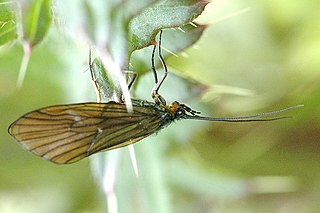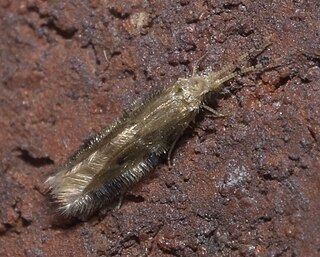
Limnephiloidea is a superfamily of Trichoptera caddisflies.

The Hydroptilidae are a large family of caddisflies (Trichoptera) with a worldwide distribution. They are commonly known as microcaddisflies or purse-case caddisflies, in reference to two characteristic traits of this family: Hydroptilidae are much smaller than other caddisflies, rarely exceeding 5 mm (0.20 in) in length. Their larvae do not build a protective case until the final instar of their growth. At that time however, they build a typically Purse-shaped case, either portable or stuck to the substrate, in which the larva finishes growth and pupates.

The Ecnomidae are a family of caddisflies comprising 9 genera with a total of 375 species.

The Psychomyiidae are a family of tube-making caddisflies. Members of this family are typically very similar to polycentropodids, most of them can be differentiated by the spur formula is 2-4-4, thyridial cell short, absence of the forewing fork I, and hindwing forks I and IV. Male genitalia has elongate preanal appendages, and reduced tergum IX. The larvae differ by the submental sclerites separated, foretrochantin broad, and the pupal mandible apex whip-like. Larvae construct long silken galleries.
Kokiriidae is a family of insect in the order Trichoptera. It was discovered in 1964 and is found in Australia, Chile, New Caledonia, and New Zealand. It consists of fifteen species and six genera.
Hydroptila armata is a species in the family Hydroptilidae ("microcaddisflies"), in the order Trichoptera ("caddisflies"). Hydroptila armata is found in North America.
Hydroptila callia is a species in the family Hydroptilidae ("microcaddisflies"), in the order Trichoptera ("caddisflies"). Hydroptila callia is found in North America.

Brachycentrus is a genus of humpless casemaker caddisflies in the family Brachycentridae. There are at least 30 described species in Brachycentrus.

Limnephilinae is a subfamily of northern caddisflies in the family Limnephilidae. There are at least 65 genera and 600 described species in Limnephilinae.

Chimarra is a genus of little black caddisflies in the family Philopotamidae. There are more than 630 described species in Chimarra.
Hydroptila rono is a species of microcaddisfly in the family Hydroptilidae. It is found in North America.

Hydroptilinae is a subfamily of microcaddisflies in the family Hydroptilidae. There are at least 60 genera and 1,600 described species in Hydroptilinae.
Hydroptila icona is a species of microcaddisfly in the family Hydroptilidae. It is found in Central America.

Hydatophylax is a genus of northern caddisflies in the family Limnephilidae. There are about 14 described species in Hydatophylax.
Hydroptila grandiosa is a species of microcaddisfly in the family Hydroptilidae. It is found in North America.
Liadotaulius is an extinct genus of caddisflies. It is currently (tentatively) placed in the family Philopotamidae, though it has previously been placed in the extinct families Necrotauliidae and Dysoneuridae.

Chaetopterygini is a tribe of northern caddisflies in the family Limnephilidae. There are about 11 genera and at least 60 described species in Chaetopterygini.
Martin Ephraim Mosely was an English entomologist who specialized in the systematics of caddisflies (Trichoptera). His interest in freshwater insects was first triggered by his interest in fishing. He was also a well-known angler and fly-fisherman and contributed to the works of Frederic M. Halford, a friend and distant relative.










